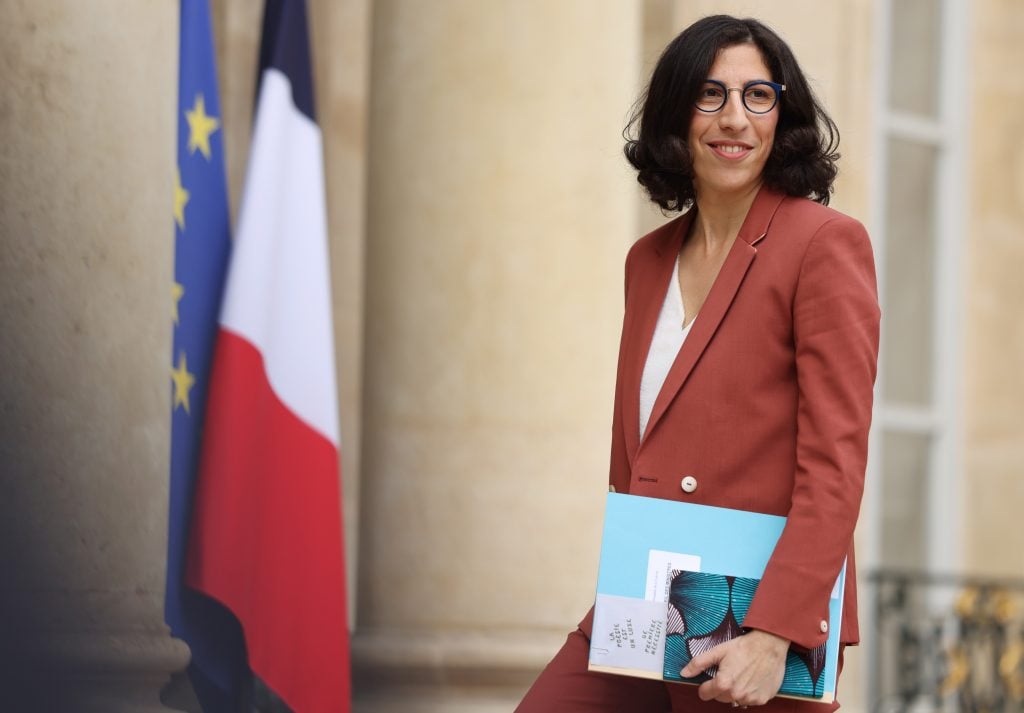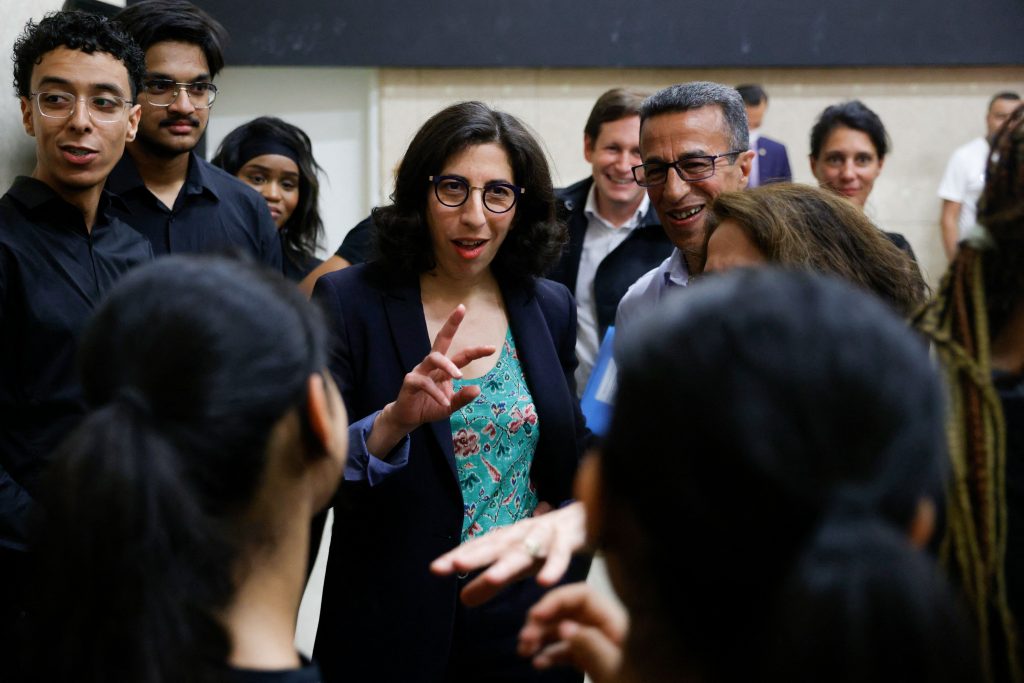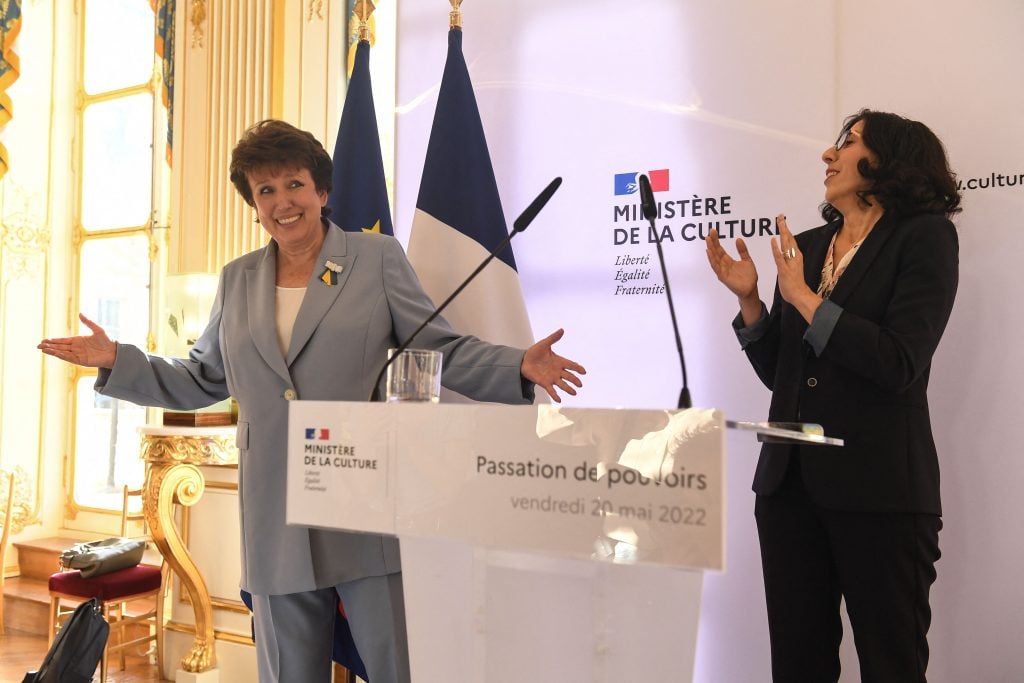Politics
French Prime Minister Appoints Performing-Arts Specialist Rima Abdul-Malak as Culture Minister. She Has a Lot to Do
Her selection was hailed by gallerists and artists.

Her selection was hailed by gallerists and artists.

Anna Sansom

Rima Abdul-Malak, French President Emmanuel Macron’s former cultural advisor, has been appointed France’s new culture minister following a cabinet reshuffle.
Abdul-Malak, 43, joins the government of new Prime Minister Élisabeth Borne, France’s second female prime minister following Édith Cresson in the early 1990s. Macron formed his new government last week, following his re-election in April for a second presidential term.
Abdul-Malak, a specialist in performing arts, replaces former culture minister Roselyne Bachelot. Yesterday, she attended the 75th edition of the Cannes Film Festival and declared that her challenge is “to make a new generation come to the cinema,” following a recent survey that nearly half the French population is going to the cinema less frequently since the pandemic.
Born in Beirut, Abdul-Malak has dual French-Lebanese citizenship. Her family left Lebanon during the Lebanese Civil War and settled in Lyon. After studying development and international cooperation at the Sorbonne, she worked for two charities: Culture et Pensée Libre (affiliated with the Catholic Committee against Hunger and for Development) in the occupied Palestinian territories, and Clowns Sans Frontières, an association that supports victims of humanitarian crises through performing arts.
Next, Abdul-Malak worked in the cultural department of former Paris mayor Bertrand Delanoë before becoming a cultural attaché at the Consulate of France in New York, from 2014 to 2018. In 2019, she became a cultural advisor to Macron. She begins her new job at a difficult time, given how France’s culture sector has been deeply affected by the pandemic.

Newly appointed culture minister Rima Abdul-Malak speaks with members of a local theater company during her first official visit since her appointment at the Cultural Centre of Seine-Saint-Denis (MC93) in Bobigny, on the outskirts of Paris, on May 21, 2022. Photo: Geoffroy Van der Hasselt/AFP via Getty Images.
Parisian galleries have greeted Abdul-Malak’s nomination positively. “It’s very good news for the galleries,” Marion Papillon, president of the Comité Professionnel des Galeries d’Art (CPGA), told Artnet News. “Rima not only knows our sector well, but arrives at the head of a ministry already knowing its strengths, weaknesses, and challenges. I hope that we’ll be able to collaborate concretely to strengthen the place of the visual arts.”
Fellow gallerist Georges-Philippe Vallois recalls coming into contact with Abdul-Malak when, as the CPGA’s then-president, he reached out to the French consul in New York for help promoting the country’s artistic scene. “Rima was my main contact,” Vallois noted, describing her as “available, committed but also very professional. We created [an artist’s] grant and encouraged an artist’s residency as well as organizing loans of works that hung on the consulate’s walls for more than a year.”
Vallois later encountered Abdul-Malak in her role as Macron’s advisor. Reflecting on the “continuity” of her roles, he added: “After so many ministers who seemed parachuted into the unknown, we finally benefit from an informed, willing interlocutor—a woman for whom culture isn’t a simple function but a vocation. I think that, if she is given the means, Rima is capable of conveying the ministry’s major importance.”
Meanwhile, gallerist Nathalie Obadia—who also crossed paths with Abdul-Malak during her time in New York—hopes Abdul-Malak will channel the influence of culture in international relations. “Her time in the U.S., where she displayed dynamism and inventiveness regarding projects for French artists, enabled her to gain knowledge about ‘soft power’ issues,” Obadia said. “Then, as Macron’s cultural advisor, she showed determination to save the weakened culture sector during Covid-19 restrictions. She’ll bring a new perspective to contemporary art because she’s young and knows the cultural and experimental players.”
Gallerist Kamel Mennour, who has known Abdul-Malak for 15 years, echoed these sentiments: “She has great knowledge of cultural dossiers, a great capacity for hard work, and loves culture and artists.”

French culture minister Roselyne Bachelot reacts after handing over to her successor, Rima Abdul-Malak, during a ceremony at the Ministry of Culture in Paris on May 20, 2022. Photo: JULIEN DE ROSA/AFP via Getty Images.
For the French artist ORLAN, who says that she met Abdul-Malak at an exhibition opening at the Centre Pompidou, the fact that Abdul-Malak is a woman is also significant. “I’m pleased that it’s a woman, because I know she’ll be attentive to women artists—living treasures as well as emerging ones—and she’ll know how to install parity in all the domains of art, whether for public commissions, exhibitions or juries,” ORLAN said.
While there is a consensus of enthusiasm about Abdul-Malak’s nomination, according to curator Nicolas Borriaud, her success will depend on how she populates her official ranks. He opined, “She’ll have to constitute an efficient cabinet which has real expertise and pursue a true political ambition beyond the eternal ‘democratizing of culture.’”